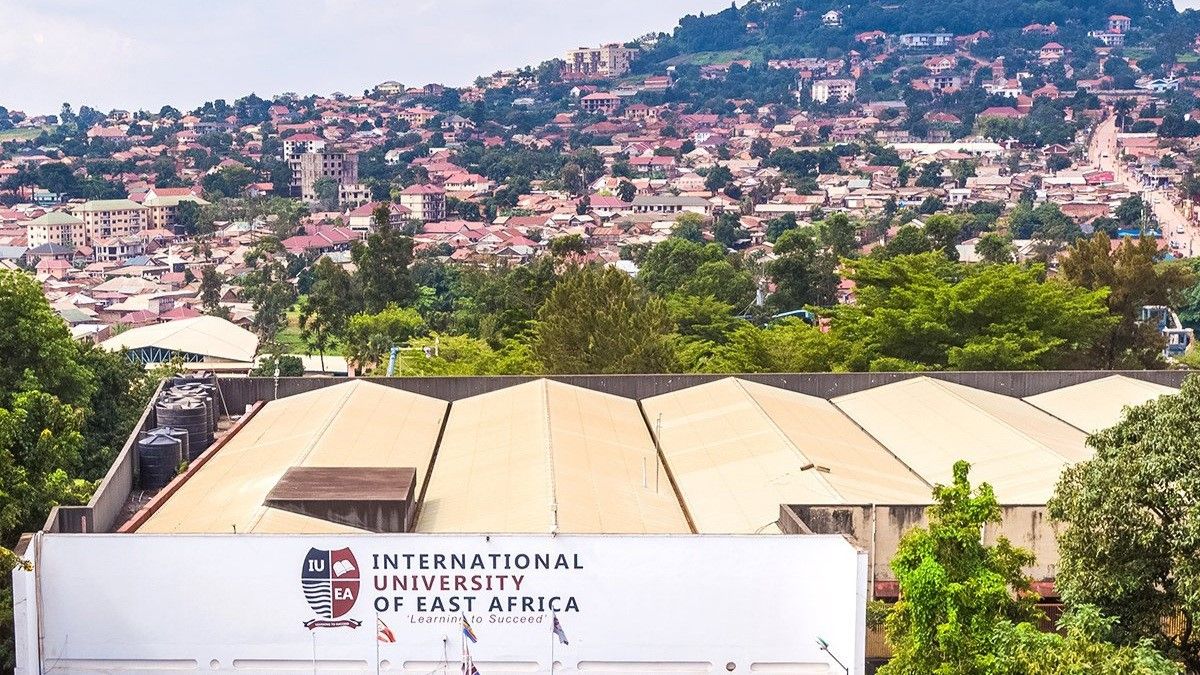
Drone view of Kansanga Hill with IUEA on the foreground. PHOTO/ Rafiki Moses, IUEA.
The social and cultural advancement of most societies today can largely be attributed to the sheer existence of education. Many believe that education is the key to success and that education is certainly the most important endeavor a person should seek. Most communities not only in Africa but all across the world have continued to accept and support the idea that success in a given society can surely be attained by acquiring a set of skills and knowledge from a school or an institution.
Every parenting adult I know at least has the goal of providing education to every member of their family. For most families, this process of imparting knowledge and skills starts as soon as the toddler is able to engage in some form of communication with the adults. Once the child turns two or three years of age, they are now likely to be enrolled in daycare or kindergarten to embark on the never-ending journey called education.
The act of acquiring a formal education has now become a meme that can be passed from one family generation to the next. For most families interested in this pursuit, the goal is to acquire some sort of knowledge and skills that may help them survive and thrive in a competitive world, and also provide a chance to create a change that may better the lives of others around them. But surely, there are other reasons as to why people seek a formal education nowadays.
Nevertheless, it is not easy to attain this goal, as it may seem that for the type of education that adds greater value to one’s life and others as a whole, it is what every family and individual is chasing, making it become exclusive and competitive. This competition in my opinion has now caused institutions to dynamically change and also become categorized into some sort of hierarchies; where you’ll have the properly managed, consistent, and well funded institutions topping the ranks while having poorly managed and less capable institutions ranking low.
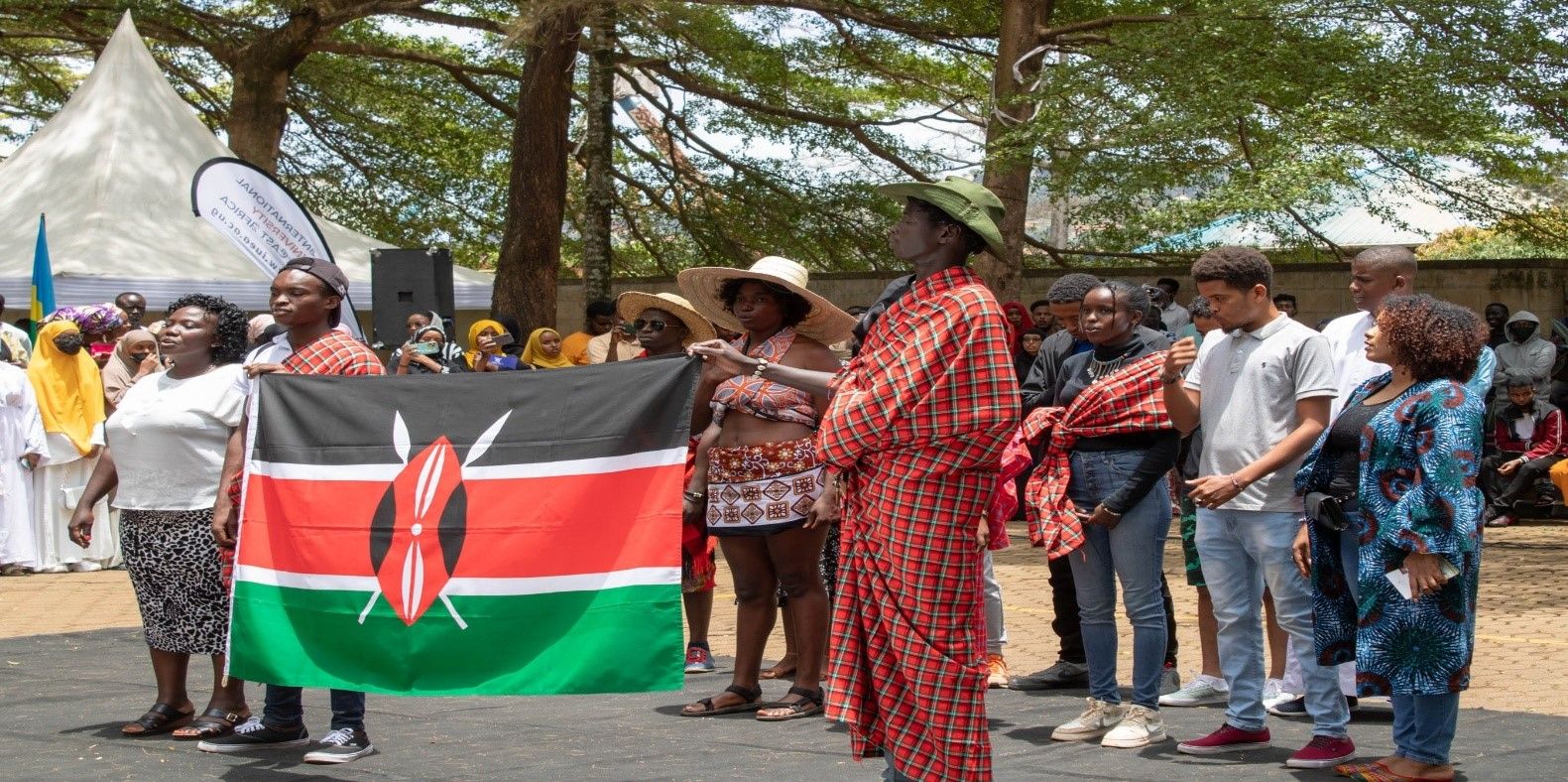
Kenyan students showcasing their traditional attire on the runway. Source: Evelina Alum/ IUEA.
For most people that are financially able, choosing the best institutions to enroll themselves or their family members is always a top priority. It is for this matter that most families and individuals are able to go the extra mile and migrate to different cities or even other countries in search of the higher educational qualities that are offered in those places.
From my experience, most people in East Africa have made various decisions in this quest of finding a richer and proper formal education. Universities and other institutions all across the region have had a significant rise in foreign students from all around the African continent in the past few decades and Uganda is certainly not an exception.
There has been a great rise in the number of foreign students all across Uganda, with Kampala city being the busiest and most preferred location in the country for seeking a formal education. One can only assume that every person wants the best for themselves or their children not because they deliberately left their homeland or chose the capital city, but rather because of the extra effort different people have put into finding the best colleges and universities around the city.
With a majority of top universities situated all across numerous districts like Wakiso, Jinja, Entebbe, Mukono, Mbarara, Soroti, Gulu, Mbale, and others, Kampala is where I stopped for a little interaction with some international students that I came across.
Kampala city has been a welcoming haven for many immigrating families from all parts of East Africa and the African continent at large. For the past decades or so I thought it would be the right place to start. I visited the International University of East Africa in Kampala to ask some of the foreign students on their take on life around their campus and in the city. What will follow are oral interviews that I carried out and the conversations were edited for clarity.
John Bullen
Bullen is a first year student at the International University of East Africa pursuing a degree in Electrical Engineering. Bullen is a South Sudanese living and studying in Kampala.
Andariya: How are you adjusting to life in a new geographical location given the fact that you recently moved in from South Sudan?
Bullen: Honestly, it’s not as hard as I thought it would be. Before I left South Sudan I was told a lot of interesting things about Uganda, like how the people are friendly and welcoming, which I found to be true. But I think nobody told me about the weather here because I find it warm sometimes but most times it has really been cold compared to South Sudan. I am slowly getting used to it, because I don’t wear my big jumpers these days.
Andariya: Could you enlighten me a little about the student diversity here on your campus and whether you managed to meet a few students that share your nationality?
Bullen: Yes, of course! I have made quite a few friends already and I'm really excited to be sharing the lecture room and campus space with students from Uganda, Nigeria, South Sudan, Kenya, Somalia, Tanzania, and other parts of Africa. I have even seen a few students that might be from Asia or Europe. It’s really great.
Andariya: Are you staying here with your parents or did you moved to Kampala all by yourself. If so, how is life without them around?
Bullen: I am a grown man as you can see. Anyway, I think it’s important to have an adult to help sometimes in different ways and also when adjusting to life in a new environment. I left my mother back home in South Sudan and I lost my father to war back in 2013. I am here trying my best every day. I have a small business that my brother is running back in Juba and that is how I am able to afford my tuition. I am actually staying in a campus hostel not very far from the university so it is easier to come to campus whenever I can.
Andariya: You spoke about losing your father to war back in 2013, can you elaborate on how war has affected your life in general?
Bullen: War has been the biggest disaster that I have ever dealt with. Not only in 2013 but like most South Sudanese, I experienced it also in 2016 when I was in Juba. In 2013, I was up in Warrap State and it was until December that everything started to unfold. When the war broke out, our family became internally displaced and we ran to seek asylum with the United Nations. My father was a military personnel and so he was compelled to participate in that war. That is how we lost him. I lost many other relatives as well and it was right after the war had stopped that I decided to go to Juba and hustle to make something. The war that broke out in Juba in 2016 lasted for about 2 days and put me in a lot of panic and fear, but thank God I survived and I am here talking to you.
Faryida Hureeya
Faryida is from Somalia and is also a student at the International University of East Africa. She is pursuing a diploma in Accounting.
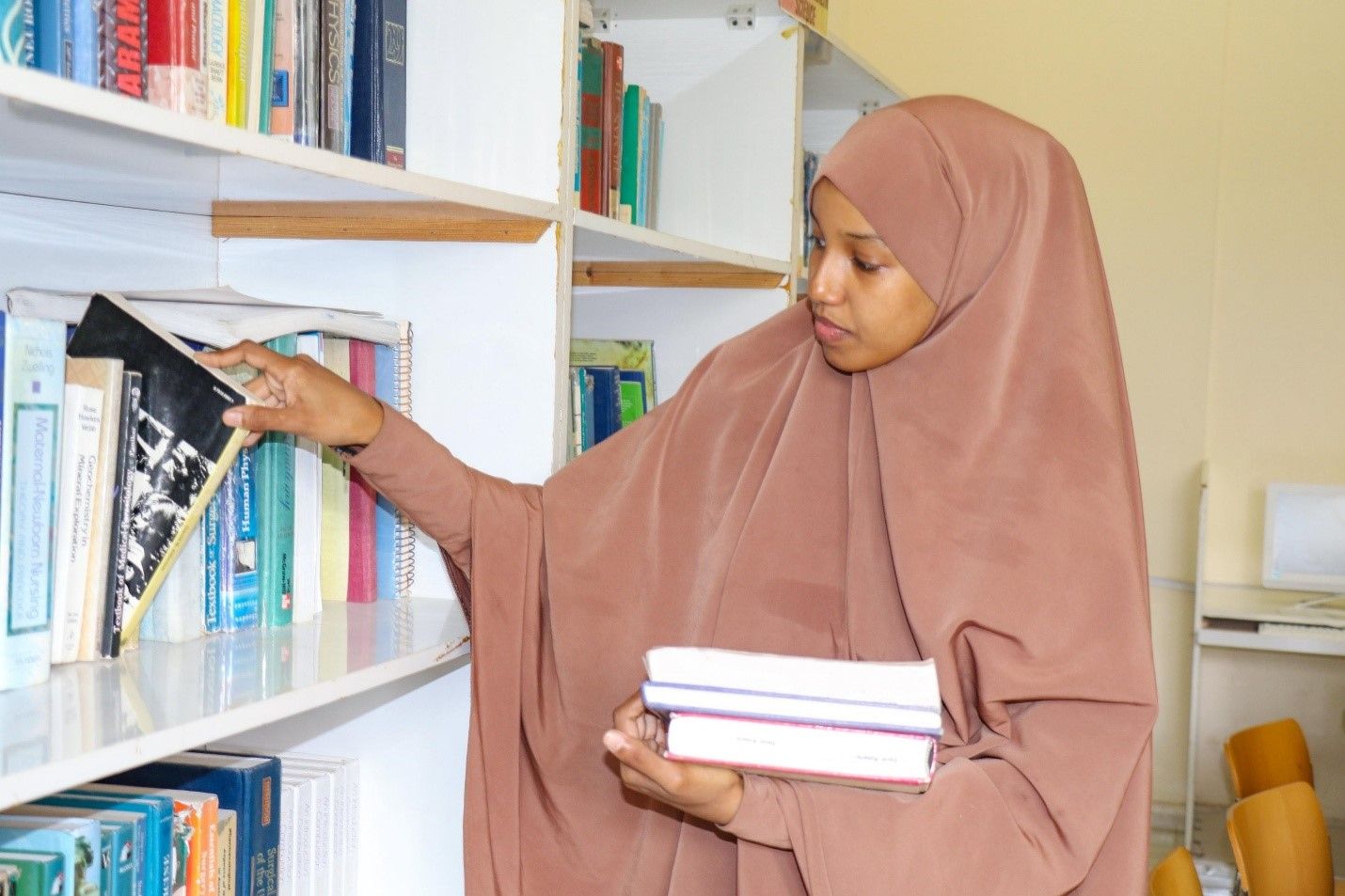
Faryida finding a book at the library. Source: Morris Mel
Andariya: How can you describe your experience here at the University and why did you choose Kampala for your education?
Faryida: My experience here at the university is not bad, so maybe let me just say fair. The university has many students and I have the opportunity to learn from different people here. I am still improving my English and I think it is now slightly better, so really I thank everyone. I came here to Kampala with my mother and two sisters. I like Kampala and I think that maybe after I graduate I will work here.
Andariya: What is life like for you here around the city of Kampala, has it been easy to socialize with all the different people you have met?
Faryida: I have not really met a lot of people here because I am very busy with my school and also have some duties at home but for all the people I have met, I have enjoyed sharing my experiences as I also learn from them. This is how I even learned to speak English. In the market, if you want to buy something, you have to know how to speak Luganda or English. So I didn’t start learning English from the University, but from the community.
Andariya: What about the Somali Community here? How big is it and do you find it supportive and welcoming for you?
Faryida: Of course. I think the Somali Community here in Kampala is very welcoming and supportive in every way I can think of. And yes it is very large but we still know most of them here. It is like I can know someone easily if they told me their family name or through a friend. We have many places for relaxing and meeting with friends but they are mostly for men not women.
Andariya: What are some of your plans after graduating, do you plan to return to Somalia or seek opportunities here in Uganda?
Faryida: I really don’t know but I think I want to try to build my skills first and maybe I can look for a job in a bank. I want to work in a bank and I think anywhere can be okay as long as my family is not far away from me. I may also return to Somalia because as you know sometimes we want to try and do good things for our country. So maybe one day I will return to my homeland.
Elijah Omali
Elijah Omali is a student from Nigeria here at the International University of East Africa. He is pursuing a degree in Computer Science.
Andariya: Knowing you journeyed a lot of miles to be here, I am curious to know what made you choose East Africa and in particular Uganda for your studies. Are you here with your family as well?
Omali: Thank you for asking. I am actually here all by myself and left my family in Abuja, but I regularly communicate with them through social media. My father covers all my necessary needs including my tuition fees. I first came to Uganda in 2014 with my father due to his work transfer to Kampala, but ever since he returned back to Nigeria, he suggested I needed to continue with my studies here since I completed my secondary education in Uganda. Honestly, I am enjoying it here.
Andariya: So how are you coping with life here in Kampala without your family around, and do you feel like you have some extra freedom to do whatever you want?
Omali: Because of the fact that I’ve been here for almost 8 years, I think I can say that I am quite familiar with everything. Kampala is now my home and I can continue living here without my family, but even when I am with my family I’m free to do almost anything.
Andariya: Do you think extra freedom for young people like yourself without any criticism or restrictions from parents is safe and healthy in Uganda?
Omali: My father speaks to me on the phone at least every week and he is always enlightening me about the difficulties of life and what he wants me to be doing or not doing. I think that in some way I am very lucky to have someone that stays concerned about my well-being even when he’s not close enough. Too much freedom without moderation is dangerous and that’s why I feel like it may be dangerous for young people who have no self-control in life. I think it is very important to know what you are doing and why you are doing it.
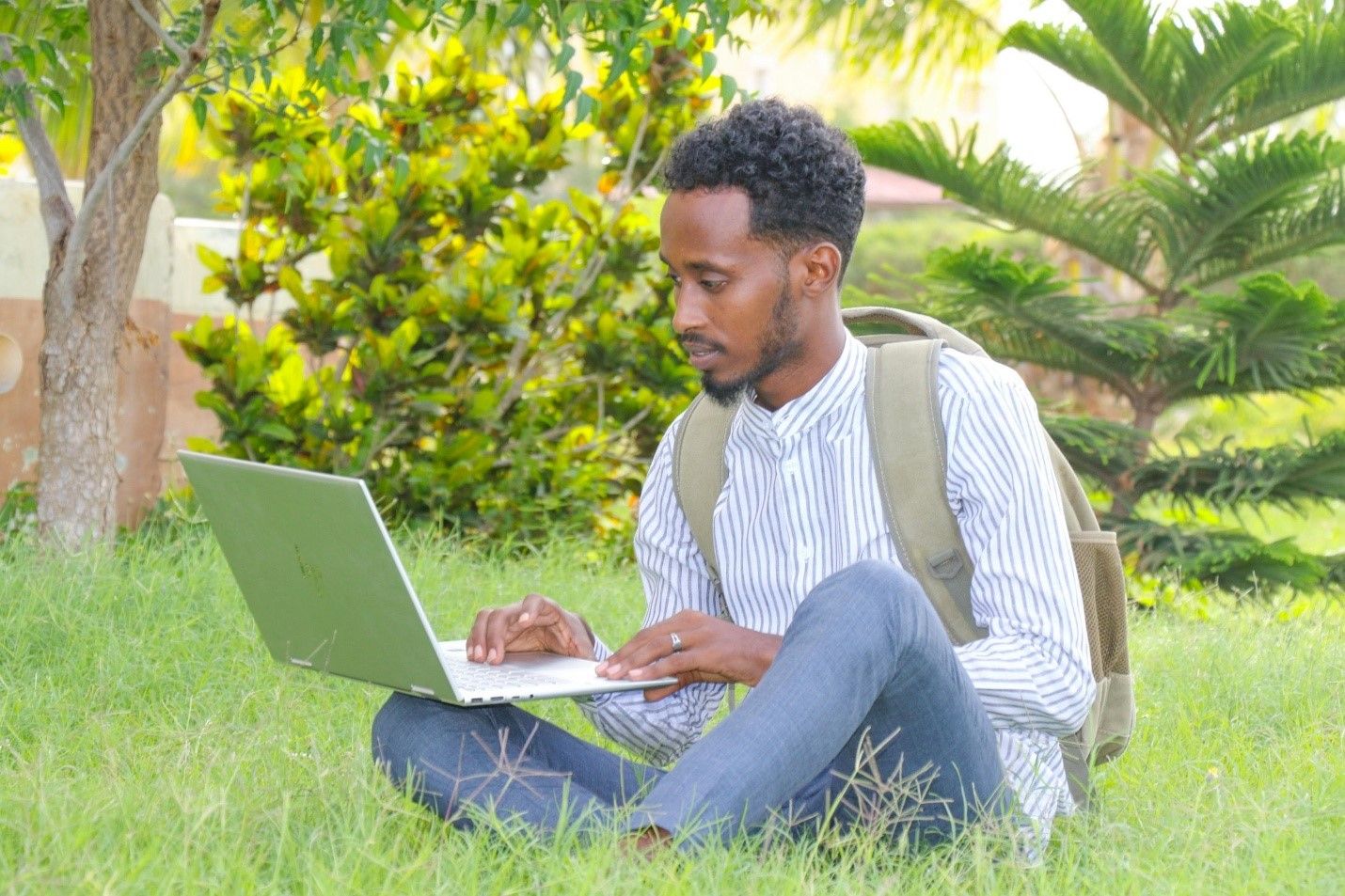
A student using his laptop at the IUEA campus. Source: Morris Mel
Ebamu Stephen
And lastly, Ebamu Stephen from Kenya. He is a law student who will be graduating from IUEA this fall.
Andariya: Let us begin with the COVID19 pandemic, how has it affected your life and that of other students?
Ebamu: Since the lockdown was issued in the early months of 2020, everything slowed down and this was something new to me and to other students. My campus like all other campuses was closed and that is when online learning started to become the in thing. At first, I was not really familiar with learning and doing my exams from a website because I originally enrolled in the usual program where a student sat in a classroom with a lecturer. As for now, we are indeed back to that style of going to campus to attend lectures, but online classes have also become popular and have continued for those who wish to have them.
Andariya: Do you find online learning beneficial in a way, and what would you say are the downsides to it?
Ebamu: I personally find it to be great because I can attend classes in the comfort of my room and not disturb myself by finding clothes to wear to the lecture room every day. I’m not sure if you knew this but looking fresh and trendy for a guy like me is really important around the campus. It also saves me money to not have to go to campus every day. Online classes are most of the time recorded and you can always get back to what you might have missed.
Andariya: What about the downside of it?
Ebamu: I think the downside of online lectures for me is the fact that I feel we don’t get to engage deeply as a class like when you are in a physical lecture room. When we are using zoom, we only have the lecturers explaining but rarely will you hear students asking questions. I think that the students are usually thoughtful and not wanting to look like they are delaying the lesson, or perhaps they are fearful of being the center of attention. I also think that there are still some difficulties students face when using their computers or phones, I don’t think that everyone is competent enough when it comes to using technology, some people just can’t admit when they don’t know what they are doing on their devices. I really hope people can start being real with themselves.
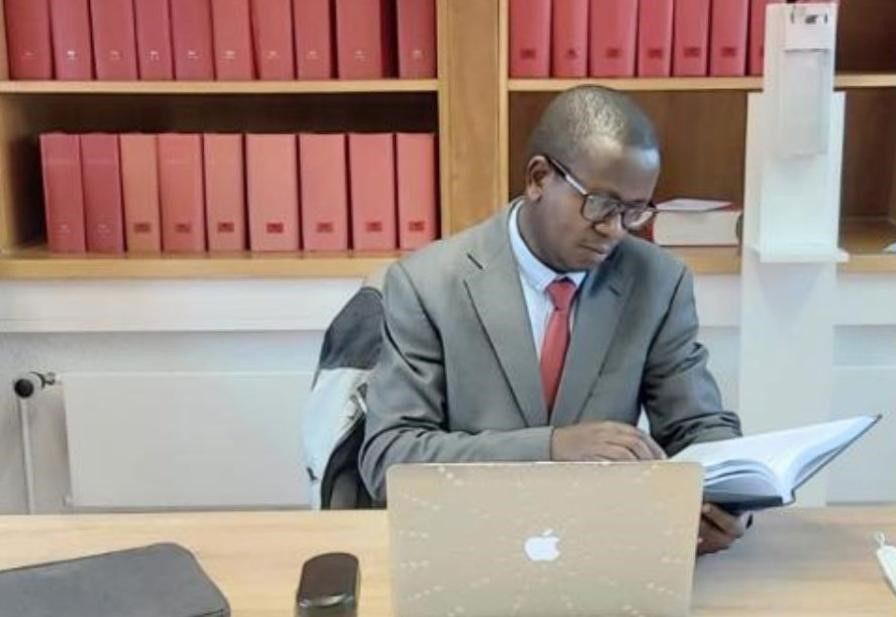
Ebamu reading in the university library. Source: Morris Mel
Andariya: The next question has to do with the educational system here in Uganda. I would like to know your opinion as a student about whether the educational system in Uganda, and most African countries, needs to be reformed and structured in a new way?
Ebamu: This is an important question and I will try to make an effort of answering it in a neutral manner. I think the educational system in Africa as a whole is very different from the western world. Correct me if am wrong but I am told that in countries like the United States, children are nurtured in ways that bring out the best in them. A child’s ability is accessed during elementary school and then the teacher can advise a parent on what career path that child may pursue. That alone makes a great difference not only to the child but to an entire enterprise. If a child is able to be categorized into a particular field because of their level of competence, then there is a high chance that this child will be successful in addition to benefiting the field that they are working in and the entire nation. Maybe that is exactly what is missing with our educational system here in Africa and that is what I hope should be reformed.
Andariya: Lastly, what advice would you give your colleagues and other students from all parts of Africa?
Ebamu: I will say that I wish to see them work towards their goals and to keep dreaming. Don’t give up and always do what you think is right and helpful. Be kind to other people you meet because in this world you never know who you might meet. It could be someone who will change your life for the good.
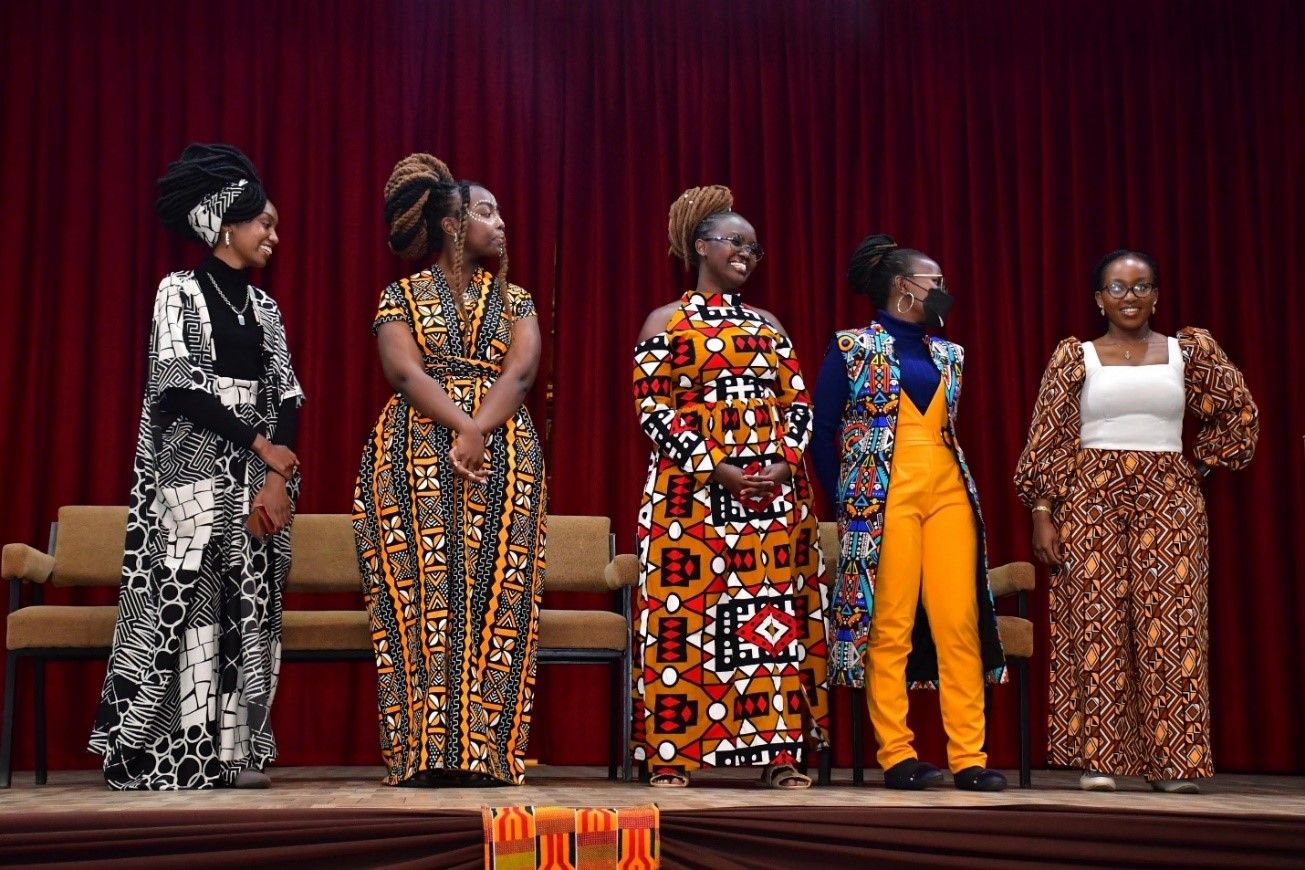
Students inside the Auditorium on AfroCulture Show Day. Source: IUEA website.
Conclusion
I would like to appreciate every student who took the time to share their experiences about their daily life at university. I express gratitude to Bullen for his insightful comments on how that war in South Sudan impacted his life. Fariyda helped us relate to her experiences as a Somali living and studying in Kampala, Ebamu for the in-depth perspective of life and education in Uganda, and Omali who is surely proof that distance means nothing in the quest for an education.
Lastly, I would like to thank the administration of International University of East Africa for giving me the chance to listen to interesting stories and experiences from the students that I had the privilege to interview.
